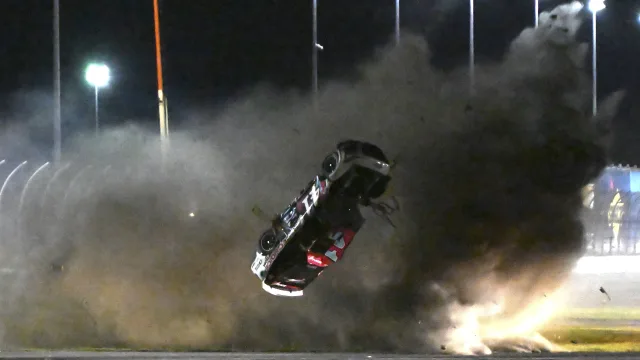Ryan Preece found himself at the center of intense emotions after a dramatic wreck at the Texas NASCAR race, an incident that occurred during Carson Hocevar’s first Cup Series pole start. The collision, which unfolded with just as much confusion as it did disappointment, left Preece visibly frustrated, especially as Hocevar, one of the sport’s newer faces, took public responsibility and issued an apology for the crash. The high-stakes atmosphere at Texas Motor Speedway only amplified the fallout, as fans and teams alike looked for answers in the aftermath.
As the dust settled, Ryan Preece emerged from the infield care center and did not hide his feelings regarding the blame directed at Carson Hocevar. The Texas wreck, which ended Preece’s hopes for a strong finish, added to ongoing conversations about driver responsibility and awareness on the track, especially among younger drivers in the NASCAR Cup Series. Preece’s reaction reflected not only his immediate disappointment but also the broader frustration that comes from seeing a promising race slip away because of another driver’s error.
After the race, Carson Hocevar took to the media to offer an explanation and a direct apology. Speaking candidly to reporter Bob Pockrass of FOX Sports, Hocevar admitted,
I apologized to him and his guy, same with my guys, right? Just got in there and started to slide up, and he got to the right rear, and I was already crossing somebody’s wake and got tight from him on my door and the car in front. I mean I’m out of the gas and have wheel, and I just didn’t predict to be in that spot, to panic, or to have to change directions, you have to predict it, and I didn’t, I just didn’t predict he would get there if I’m being honest. That’s on me, I wrecked myself, right?
This open admission from Hocevar does little to erase the sting for Ryan Preece, who, like many veteran drivers, demands more precision and situational awareness in the Cup Series. Preece’s reaction is understandable, as the wreck not only impacted his finish but also contributed to a narrative where newer drivers, such as Hocevar, are often criticized for costly errors. The situation brings to mind past incidents involving other young drivers who had to learn from similar mistakes, sometimes at the expense of more seasoned competitors.
For Carson Hocevar, the Texas weekend was a turbulent mix of highs and lows. He showed considerable speed by winning the pole, but has struggled to convert that raw pace into consistently good finishes. With five results of P30 or worse this season and only two top-10 finishes, pressure mounts for him to lift his performance and reduce errors. Despite his apology and acknowledgement of fault, the onus now falls on Hocevar to learn from missteps like the Texas wreck and rebuild trust on track. Meanwhile, Ryan Preece’s solid reaction underscores the challenges faced by experienced drivers when youthful exuberance meets the relentless realities of Cup Series racing.
The significance of this event lingers beyond a single race, as it reminds teams, drivers, and fans how quickly fortunes can turn and tempers can flare. Ryan Preece, bearing the brunt of frustration, must now regroup and look ahead to upcoming races, while Carson Hocevar faces mounting scrutiny as he attempts to balance speed with smarter decision-making. In NASCAR, reputations rise and fall in moments like these, making the aftermath of this wreck a testing ground for both drivers’ resolve and futures in the sport.
